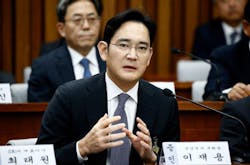Samsung's Jay Y. Lee Set Free in Unexpected Court Reversal
A South Korean appeals court let Samsung Electronics Co. Vice Chairman Jay Y. Lee walked free from prison after suspending his sentence for bribery, a stunning reversal that raises questions about the government’s ability to reform the nation’s most powerful corporations.
The heir to the country’s largest conglomerate had appealed his sentence, which the court reduced by half to two and a half years on Feb. 5. He will be on probation for four years, the court said.
Even Lee, 49, appeared stunned. He stood up and looked around with a blank stare after the ruling, and was blushing as he walked out of the courtroom. He had been detained for almost a year. The decision follows a familiar pattern, however: over the years, Lee’s father, as well as other South Korean business executives, had been tried in court for corruption only to receive suspended sentences.
“We have a new president in office, but the ‘Republic of Samsung’ lives on,” said Kwon Young-June, a professor who researches corporate governance at Seoul’s Kyung Hee University. “It’s startling to see that the practice of letting chaebol chiefs get away with suspended sentences is continuing.”
It wasn’t clear whether Lee would immediately return to Samsung and take on any formal role. Lee headed to see his hospitalized father, Lee Kun-hee, after being released, according to local reports.
Jay Y. Lee’s grandfather founded Samsung 80 years ago, and his father built it into a powerhouse by expanding in semiconductors and smartphones. The sprawling conglomerate has dozens of businesses in insurance, construction, advertising, and shipbuilding. The Lee family controls the group through cross-shareholdings, though it owns about 1% of the equity, according to November 2017 statistics released by the Fair Trade Commission.
Lee was the highest-profile business figure to have been embroiled in a graft probe that brought down former Korean President Park Geun-Hye and inflamed resentment toward the country’s well-connected chaebol.
Prosecutors originally sought a dozen years for Lee, arguing that would help establish the rule of law in a country re-examining ties between government and business. Park was ousted by the Constitutional Court and was replaced by Moon Jae-in, who promised to rein in the family-run chaebol dominating the economy.
“It’s truly disappointing,” said Park Yong-jin, a National Assembly member from Moon’s party.. “We confirmed once again that Samsung is above the law and the court.”
The outrage spread into the streets of Seoul.
“Powerful people always win, whether it’s business or politics,” said Jung Myeong-suk, a 65-year-old security guard said as he was heading to work. “When a commoner commits a crime, there’s no forgiveness, but for those with status and power, the entire system takes their side.”
A Seoul court had earlier convicted Lee of giving a confidante of Park’s thoroughbred horses in the hope it would secure government support for a merger that would help his ascension to the top of the company. Lee denied any legal wrongdoing and appealed the original sentence, saying he never sought to unseat his father as Samsung Electronics chairman in the first place.
Former Samsung Corporate Strategy Office chief Choi Gee-sung and former President Chang Choong-ki, who were each sentenced to four years in prison, also received suspended prison terms. The court said that this wasn’t a typical example of the “cozy relationship between politics and business,” adding that there was no evidence that the defendants had requested or gained benefits from offering a bribe to Park.
“Power-business collusion is not found here,” judge Cheong Hyung-Sik said. “The essence of this case is that the defendant passively answered to political power.”
The judge said he concluded that Park “browbeat” Samsung’s executives into giving bribes, while Lee couldn’t resist the request from the president and her confidante. He also stressed responsibility should heavier for public officials in bribery cases.
The Samsung scion’s original six-month-long trial centered on a 2015 merger between two Samsung affiliates that gave Lee fresh shares in Samsung C&T Corp., then a major shareholder in smartphone maker Samsung Electronics.
Prosecutors alleged Lee knew about a secret relationship between Park and her friend and used that knowledge to ensure the deal passed, tightening his grip on the smartphone and memory chipmaker. Samsung says it merged the two companies to boost their competitiveness, and Lee argued during the trial that the deal didn’t shore up his control over the electronics company.
By Sam Kim
About the Author
Bloomberg
Licensed content from Bloomberg, copyright 2016.
